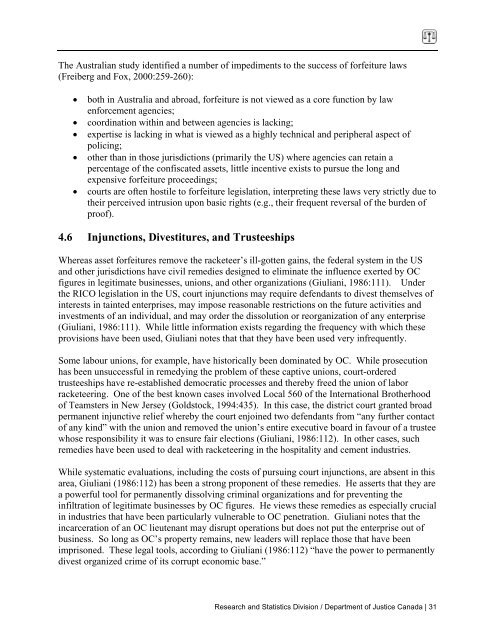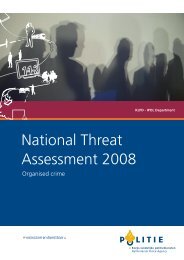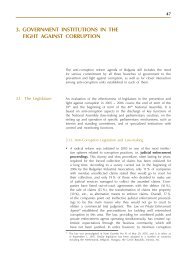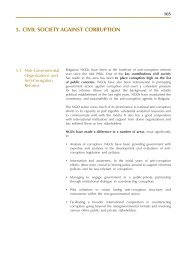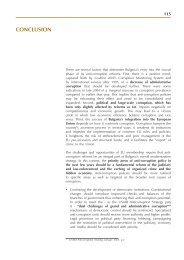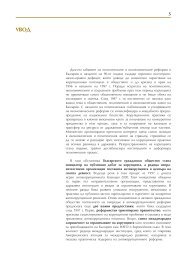Assessing the Effectiveness of Organized Crime Control Strategies ...
Assessing the Effectiveness of Organized Crime Control Strategies ...
Assessing the Effectiveness of Organized Crime Control Strategies ...
You also want an ePaper? Increase the reach of your titles
YUMPU automatically turns print PDFs into web optimized ePapers that Google loves.
The Australian study identified a number <strong>of</strong> impediments to <strong>the</strong> success <strong>of</strong> forfeiture laws<br />
(Freiberg and Fox, 2000:259-260):<br />
• both in Australia and abroad, forfeiture is not viewed as a core function by law<br />
enforcement agencies;<br />
• coordination within and between agencies is lacking;<br />
• expertise is lacking in what is viewed as a highly technical and peripheral aspect <strong>of</strong><br />
policing;<br />
• o<strong>the</strong>r than in those jurisdictions (primarily <strong>the</strong> US) where agencies can retain a<br />
percentage <strong>of</strong> <strong>the</strong> confiscated assets, little incentive exists to pursue <strong>the</strong> long and<br />
expensive forfeiture proceedings;<br />
• courts are <strong>of</strong>ten hostile to forfeiture legislation, interpreting <strong>the</strong>se laws very strictly due to<br />
<strong>the</strong>ir perceived intrusion upon basic rights (e.g., <strong>the</strong>ir frequent reversal <strong>of</strong> <strong>the</strong> burden <strong>of</strong><br />
pro<strong>of</strong>).<br />
4.6 Injunctions, Divestitures, and Trusteeships<br />
Whereas asset forfeitures remove <strong>the</strong> racketeer’s ill-gotten gains, <strong>the</strong> federal system in <strong>the</strong> US<br />
and o<strong>the</strong>r jurisdictions have civil remedies designed to eliminate <strong>the</strong> influence exerted by OC<br />
figures in legitimate businesses, unions, and o<strong>the</strong>r organizations (Giuliani, 1986:111). Under<br />
<strong>the</strong> RICO legislation in <strong>the</strong> US, court injunctions may require defendants to divest <strong>the</strong>mselves <strong>of</strong><br />
interests in tainted enterprises, may impose reasonable restrictions on <strong>the</strong> future activities and<br />
investments <strong>of</strong> an individual, and may order <strong>the</strong> dissolution or reorganization <strong>of</strong> any enterprise<br />
(Giuliani, 1986:111). While little information exists regarding <strong>the</strong> frequency with which <strong>the</strong>se<br />
provisions have been used, Giuliani notes that that <strong>the</strong>y have been used very infrequently.<br />
Some labour unions, for example, have historically been dominated by OC. While prosecution<br />
has been unsuccessful in remedying <strong>the</strong> problem <strong>of</strong> <strong>the</strong>se captive unions, court-ordered<br />
trusteeships have re-established democratic processes and <strong>the</strong>reby freed <strong>the</strong> union <strong>of</strong> labor<br />
racketeering. One <strong>of</strong> <strong>the</strong> best known cases involved Local 560 <strong>of</strong> <strong>the</strong> International Bro<strong>the</strong>rhood<br />
<strong>of</strong> Teamsters in New Jersey (Goldstock, 1994:435). In this case, <strong>the</strong> district court granted broad<br />
permanent injunctive relief whereby <strong>the</strong> court enjoined two defendants from “any fur<strong>the</strong>r contact<br />
<strong>of</strong> any kind” with <strong>the</strong> union and removed <strong>the</strong> union’s entire executive board in favour <strong>of</strong> a trustee<br />
whose responsibility it was to ensure fair elections (Giuliani, 1986:112). In o<strong>the</strong>r cases, such<br />
remedies have been used to deal with racketeering in <strong>the</strong> hospitality and cement industries.<br />
While systematic evaluations, including <strong>the</strong> costs <strong>of</strong> pursuing court injunctions, are absent in this<br />
area, Giuliani (1986:112) has been a strong proponent <strong>of</strong> <strong>the</strong>se remedies. He asserts that <strong>the</strong>y are<br />
a powerful tool for permanently dissolving criminal organizations and for preventing <strong>the</strong><br />
infiltration <strong>of</strong> legitimate businesses by OC figures. He views <strong>the</strong>se remedies as especially crucial<br />
in industries that have been particularly vulnerable to OC penetration. Giuliani notes that <strong>the</strong><br />
incarceration <strong>of</strong> an OC lieutenant may disrupt operations but does not put <strong>the</strong> enterprise out <strong>of</strong><br />
business. So long as OC’s property remains, new leaders will replace those that have been<br />
imprisoned. These legal tools, according to Giuliani (1986:112) “have <strong>the</strong> power to permanently<br />
divest organized crime <strong>of</strong> its corrupt economic base.”<br />
Research and Statistics Division / Department <strong>of</strong> Justice Canada | 31


